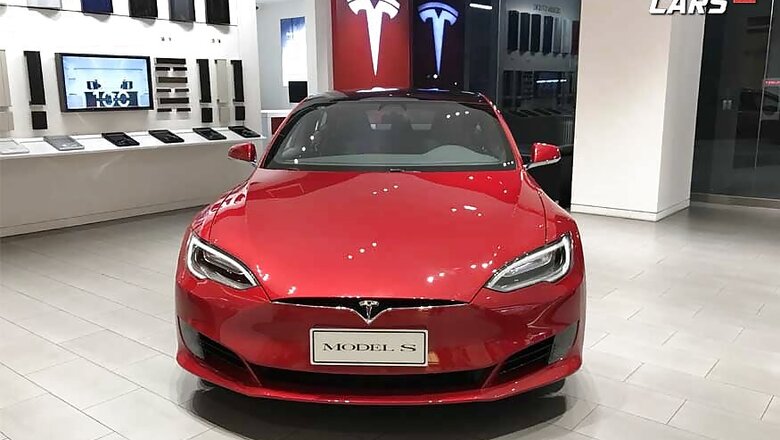
views
Since the production of the very first commercial car by Henry Ford, the automotive industry has been in a constant endeavour of bringing innovation to their products. Owing to this, we have come a long way from a 22-horsepower, 2.9L inline-four-cylinder engine of the Ford Model T to a mind-boggling 1200-horsepower, 8L W16 engine (two V8 engines bolted together) famously bragged by the Bugatti Veyron. The journey from a top speed of 70 km/hr to a whopping 400 km/h plus has had a lot of encouraging factors, a major one of them being the worldwide competition amongst the carmakers. Now the car-making companies face an altogether different hurdle though and that is to bring into trend an alternative fuel for their automobiles. What’s more, this one hurdle is as unnerving as ever. Our planet Earth is at stake.
The respite, however, is that such automobiles (driven by an alternative fuel) have come into play and at a larger-than-before scale. With the depleting layer of fossil fuels, automakers have hailed electric batteries as the most suitable alternative to petrol or diesel. As the automotive brotherhood works towards a common goal, for probably the first time ever, there is one player that shines through. After around 14 years of being in production, Tesla Inc, formerly known as Tesla Motors, has made a dominating image for itself in the automobile fraternity as a leading electric-car manufacturer. Though the company initiated with an aim to produce an electric sports car named Roadster, which saw sales of more than 2,250 units until its discontinuation in 2012, Tesla masterminds decided to shift to a more mass-friendly electric car production. After declaring an IPO in 2010, Tesla Motors came out with its first electric car for the masses and as if unveiling a futuristic technology to the world, stylishly named it the Model S.
To date, Tesla has spread its stores and galleries to 29 countries across the globe. While Portugal and Scotland miss out on them, all the other 27 countries have Tesla service centres as well. A visit to one such Tesla store in Beijing provides a glimpse of the prevalence of the shiny electric cars in China. Tesla Models can be seen parked at various charging spots, drawing the “eco-friendly” fuel for their next run. As per the official website of Tesla, the company has set-up 13 such Superchargers across Beijing, complemented by 30 scaled down charging stations which Tesla calls “Destination-Charging”. These Destination charging stations and Superchargers across 52 countries around the globe have been a key factor in making Tesla’s electric cars a commercial hit. While electric cars have since long been in production, such electric-vehicle charging stations were not given enough importance to make batteries a lucrative enough alternative to fossil fuels. Tesla can easily be accredited of being one of the very few companies to have taken the initiative to set up its own electric charging stations, establishing a network so wide that it enables long journeys through electric cars a viable option. This feat, at this scale, has not been achieved by any other auto carmaker in the history.
Beijing Central boasts of having the biggest Supercharger station in the entire Asia-Pacific region. The station can cater to 20 Teslas at any point of time. Right next to it is the Beijing Central Tesla store where Tesla Model S and Tesla Model X can be seen on display. A couple of product specialists at the store attend to the visitors, helping them with the features and specifics of the cars. The sales process that follows lets the buyers book their preferred model through the online Tesla website. Each Tesla Model comes with a free Home Charging unit, available with either an 8.5-inch cable or a 24-inch cable. The Home Charging Units are to be permanently mounted on a wall and enable the car’s charging at the owner’s convenience. Couple these with the 500+ superchargers across the whole of China and 2000 plus destination chargers allocated at shopping centres, cinemas, restaurants, etc.
Tesla cars are an expensive affair though. Let the “mass-production cars” tag not fool you. A basic Tesla Model S in China costs around 7,23,500 Yuan, close to Rs 71 Lakh if they were to be available in India. A price for a base variant of the Model S in the US stays around $100,000. A look at the price of the Model X base model reveals an 8,73,500 Yuan (~Rs 85.6 Lakh) tag, again making the Tesla SUV only a luxury option for Indian owners. If one was to a buy a Tesla in China, one of India’s nearest Tesla markets, and then transport it to India, the brave owner will have to face the taxes, import duties and the transportation charges for the car. Result: the price of a base Tesla Model S will shoot upwards of 100 percent market price of the car in China.
Moving on from the price of owning a vehicle, there are various maintenance charges to be paid for. In the US, Tesla promises a minimal charge for the same. The official website of the US carmaker mentions “Unlike gasoline cars, Tesla vehicles require no traditional oil changes, fuel filter, spark plug replacements, or emission checks. As an electric vehicle, even brake pad replacements are rare”. As per this, the company suggests a service period of every one year for its vehicles to perform in the best condition. The first year service charge for a rear-wheel drive Tesla Model S has been listed as $475, currently equivalent to Rs 30,800. Such a servicing cost for a car in India will certainly not make it a budget option for the masses. All in all, owning a Tesla will still be limited to a few men’s game even if the electric cars make their way to India.
As of now, Tesla CEO, Elon Musk has shown interest to enter the Indian market time and again. The latest attempt by the tech billionaire has been to introduce Tesla cars to India through the single-brand retail route, requiring a mandatory sourcing of up to 30 percent of the value of goods sold in the country. When the firm initiated the bookings for its most budget offering last year, the Model 3, it had kept India on the list of countries which the car was supposed to come to. On a similar note, Musk had also hinted at setting up a Tesla Gigafactory in India – “Obviously long term it's going to make sense to have a Gigafactory in Europe, one in China and probably one in India," Musk had said on a BBC 5 live radio interview. Almost all the pointers indicate that the question is not ‘if’ but ‘when’ the US electric car manufacturer decides to set its foot in India. A bigger dilemma though is about the kind of technology that the Tesla cars would carry to India. For obvious reasons, Tesla will not be offering the self-driving technology in its cars meant for the Indian market. Even the Tesla cars in China are semi-autonomous and only offer parking assist to the owners, a scenario completely different from that in the US, where autonomous driving is a field where Tesla has a well-established name already. An even bigger challenge to be faced is the lack of EV-charging stations across the country. The fact of the matter is that till date, India has not paid much heed to any of such electric vehicles or the accompanying infrastructure required for their smooth functioning. Efforts are being made in this direction now though and the ministry is pushing things to inculcate the culture of such vehicles in the country. Nitin Gadkari, Minister of Road and Transport, had recently visited the Tesla manufacturing facility in the US, following which he even invited Musk to open a similar production facility in India. In a recent note to the automakers in the country, the minister sternly advised the lot to move for an alternative fuel. In addition to this, an agenda of establishing electric charging stations across the country is also in the discussion phase by the cabinet.
There is no denying the fact that now is the prime time to move towards an alternative fuel for automobiles and for all the right reasons. As the pollution levels across the country are rising and the ever-increasing number of vehicles being sold annually only worsening it, a dire change is needed to help establish a solid foundation for a sustainable future. Concepts like electric vehicles that run on sustainable energy are the perfect way of avoiding a doomsday situation. The leaders in the Indian tech fraternity including Vijay Shekhar Sharma (Paytm), Vishal Gondal (GOQii) and Jagdish Mitra (Tech Mahindra) understand this and are doing their bit to contribute to the cause by publicly declaring their support for the same. If the future of the country will see electric vehicles being used as a prime means of transport, we just hope that the day comes soon when electric cars of different makes can be seen zooming on the roads with a whole network of charging stations pan India to power them.


















Comments
0 comment